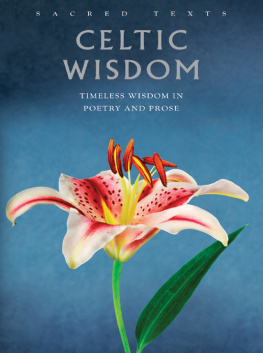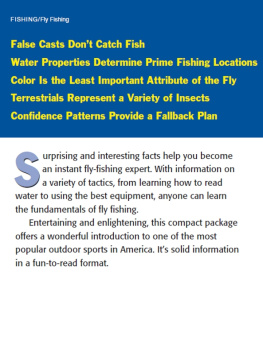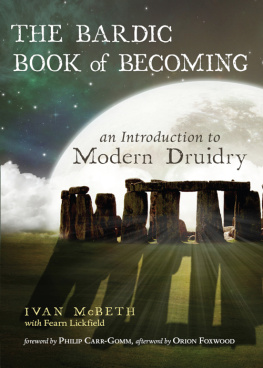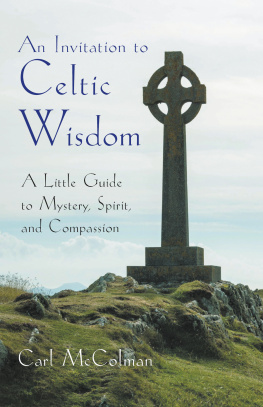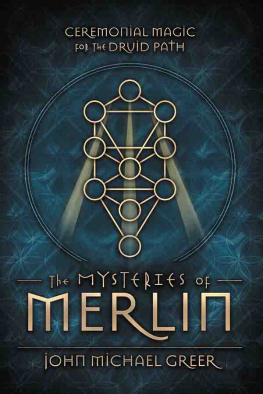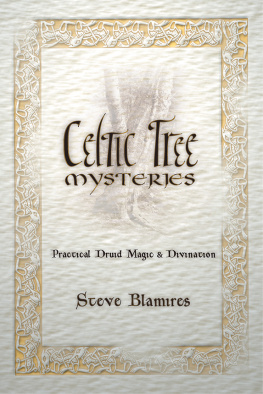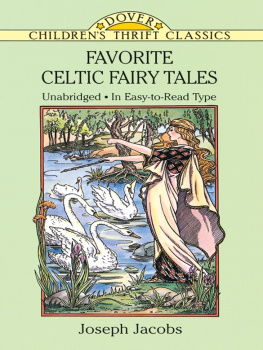SACRED TEXTS
CELTIC
WISDOM
Timeless Wisdom in
Poetry and Prose
Edited and Introduced by
Gerald Benedict

CONTENTS
The mountains never meet, but people can always encounter each other.
Ancient Irish proverb
INTRODUCTION
People associated with the name Celt emerged from trans-European groups to be recorded as early as the 6th century BCE by Greek geographers and historians as the Keltoi. The name survived in the works of Latin writers as Celtae, and the Celts eventually emerged as a distinct people with their own varied forms of the parent Indo-European languages. The Celtic languages and dialects settled into two major linguistic divisions: Goidelic, or Gaelic, is associated with the Celtic Highlanders of Scotland, the Irish and the Manx; Brythonic, derived from the Welsh Byrthon, meaning an indigenous Briton, refers to the languages of Wales, Cornwall and ancient Cumbria. Breton, spoken by people of Brittany, is descended from the Brythonic branch of the language. Galicia, in north-western Spain, is unlike other regions of that country, being characterized by its Celtic inheritance and a dialect derived from Gaelic. Sadly, these Celtic languages are now spoken only in minority communities, but there are strong initiatives to revitalize the four main groups: Irish Gaelic, Scottish Gaelic, Welsh and Breton, together with Cornish and Manx. Celtic literature in English, for example Anglo-Irish, began at different times in the histories of these respective groups, each creating a tradition of its own. It is the stories told in these languages of ancient myths, of nature full of mystery and magic, of heroes and heroines, of fairies and fabled seers, of gods both pagan and Christian, of Druids and the Celtic Christian saints that lend their themes to a unique literature. Its poetic form is given what amounts to a sacred status, its composition and recitation offered as if it were a sacrament, the poets revered as if they were saints.
A resurgent 19th-century interest in Celtic culture set out to rediscover the old Gaelic and Brythonic literature which by then had taken its place in folklore. In the process, the mythologies, superstitions, beliefs and practices on which the literature drew were reinvented. New translations of ancient prose and poetry were offered to a Victorian society in a suitably honed and proper language. Ireland has the oldest vernacular tradition of prose and poetry in Europe; emerging in the 6th century its energy has been sustained, unbroken, until the modern period. Prose, the vehicle for the heroic epics, is characterized by the kind of overstatement and absurdity that so well lends itself to satire. The poetry calls up the ancient beliefs of a vibrant nature religion that is by no means romantic; this is not the poetry of Wordsworth and Coleridge, drawing on an idealism or paradisiacal perception of nature in which humanity lives in perfect harmony with all created forms. Such rapture is certainly to be found, but it hides, timidly, behind Natures more violent, unpredictable and omnipotent persona. Nature is mischievous, deadly, unremittingly perusing what, today, we understand is its genetically programmed progress towards secure survival. The poetry echoes the harshness of the gods of Natures pantheon, whose whimsies and extravagances can only be addressed by human sacrifice. Expressive of humanitys response, the poetry evokes awe, astonishment and trepidation.
In Wales, the professionalism of the bardic tradition was maintained by a Guild of Bards who protected poetic form by means of a rule book that required a nine-year apprenticeship and poems to be written for special occasions, and which offered a scale of payment measured by the length of time served. There were also professional storytellers, and the most enduring of the stories they told were put together between 1350 and 1410 CE in a collection known as the Mabinogion. Scottish texts, written in Brythonic, such as works attributed to Aneirin and Taliesin, go back to the 6th century; works in Gaelic include those of Dallan Forgaill, and in Latin, St Columba.
Celtic Christianity, which furnished some of the texts on which this collection draws, is also known as the Old British Church, and the Culdes Church. It was at first a distinctive and home-grown form of the religion, retaining much of its pagan, pre-Christian beliefs and lore. The Synod of Whitby, held in 664 CE, effected a crucial step in the Christianization of Britain begun in 597 CE by St Augustine. Tension existed between Celtic Christianity and that of England, which followed Rome, the variant practices running side by side. At the synod the Celtic King, Oswy, decided for St Peter and Rome and gradually Christianity in its Celtic form was subsumed by Catholicism. Inevitably, such pre-Christian mythologies that have survived have done so surreptitiously, through oral tradition gathered together and recorded in written form since the Middle Ages.
The Druids were a priestly class, widely spread through pre-Roman western Europe and Britain. The name Druid may be derived from a word meaning oak, and there is an association with the mistletoe that was cut from it. A lack of primary sources makes it difficult to discern the Druid practices that were distinct from other forms of pagan animism, such as that of the pre-Christian Irish Celts. What seems clear is that Druids were custodians of ancient lore and wisdom, of astronomical and calendric knowledge, and given to prophecy, law-making and the almost holocaustic sacrifice of both animals and humans bound up in the huge wicker constructions described by Strabo and Caesar. Aspects of the lore survive in the celebration of Halloween, the making of corn-dollies and other harvest rituals, in the myths of Puck, woodwoses, the Green Man, and in superstitions loosely associated with luck and, specifically, with unlucky plants and animals.
In what sense can one speak of the sacredness of these texts? Sacredness may take a very wide sweep of people, places and things. Priests, rabbis and lamas are thought to have acquired the attributes of sacredness, but so have seers, shamans and poets; synagogues, churches and mosques are assumed to be sacred places, but so maybe are wells, streams, groves or caves; the Hebrew Torah, the Guru Granth Sahib and the Eucharistic wine and bread are accepted as sacred things, so maybe are mistletoe, a staff cut from a hazel tree or a sheaf of corn; the imitation of Christ or the creation of a mandala is taken to be a sacred practice, so also is the veneration of an oak tree or a pupils dialogue with his teacher. It is only in the reading and contemplation of these texts that their sacredness will become apparent. It will surprise many readers that heroic tales may be read not just as mythic history, but as parables of great spiritual enterprise, and of the courage and commitment needed to undertake it. It will surprise others that omens, cures, visions and anecdotes of animals and birds may be read as signs of the reverence due to everything, and of the miracle of the mundane.
Gerald Benedict
CREATION

THE CREATION STORY
An abbreviated version of the Genesis creation story, followed by an account of how the human race spread through and settled the then known world.
God made Heaven and Earth at the first, and He Himself hath no beginning nor ending.

